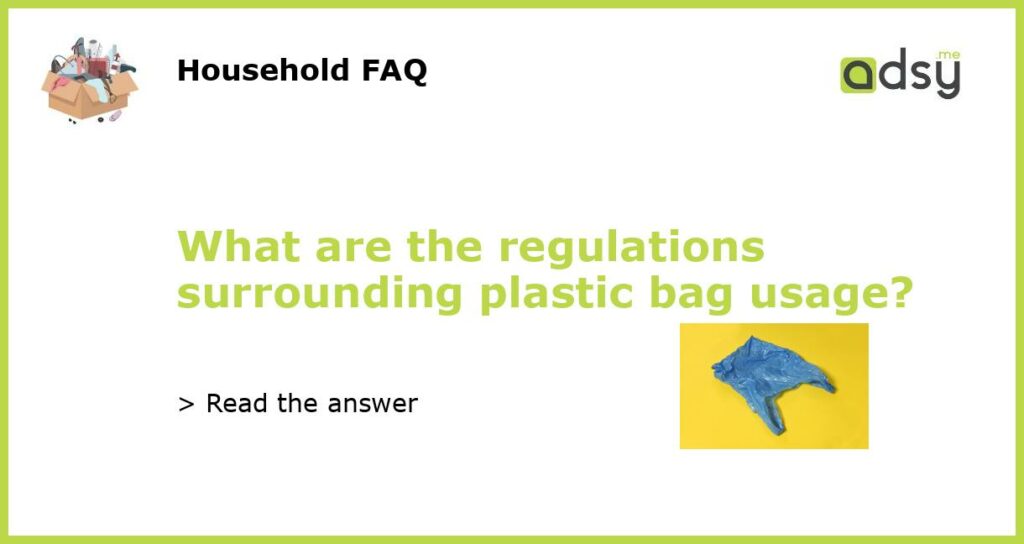Regulations surrounding plastic bag usage
Plastic bags have become a global environmental concern due to their harmful impact on wildlife and ecosystems. As a result, many countries and cities have implemented regulations to reduce plastic bag usage and promote sustainable alternatives. In this article, we will explore the regulations surrounding plastic bag usage and the steps taken by various jurisdictions to address this issue.
Plastic bag regulations across the world
Plastic bag regulations vary widely across the world, with some countries implementing strict bans and others imposing fees or taxes on their usage. In some cases, regulations are imposed at a national level, while in others, they are implemented at a regional or municipal level. Here are a few examples of plastic bag regulations from different parts of the world:
1. Rwanda: Rwanda is known for having one of the strictest plastic bag bans in the world. Since 2008, the sale, manufacturing, and use of plastic bags in Rwanda have been completely prohibited. This includes both lightweight plastic bags and thicker, more durable ones. Violators can face hefty fines or even imprisonment.
2. Denmark: Denmark has also taken a strong stance against plastic bags. Since 2003, single-use plastic bags have been subject to a mandatory fee in all retail stores. This fee has significantly reduced plastic bag consumption in the country and encouraged people to bring their own reusable bags when shopping.
3. Australia: In Australia, regulations surrounding plastic bag usage vary by state. Some states have implemented outright bans on lightweight plastic bags, while others have imposed fees or introduced recycling programs to reduce plastic bag waste. South Australia was the first state to introduce a ban on lightweight plastic bags in 2009.
Regulations in the United States
In the United States, plastic bag regulations differ by state and even by city. While there is no federal ban on plastic bags, several states and municipalities have implemented their own restrictions. Here are a few examples:
1. California: California was the first state to pass a statewide ban on single-use plastic bags in 2014. The regulation prohibited large retail stores from providing plastic bags to customers and required them to charge a minimum fee for paper bags. The ban has since been extended to include all retail stores in the state.
2. New York: New York implemented a plastic bag ban in 2020, which originally scheduled to take effect in March but was delayed due to the COVID-19 pandemic. The ban prohibits most retailers from distributing single-use plastic bags and encourages the use of reusable bags.
3. Seattle: Seattle, Washington became one of the first major cities in the United States to implement a ban on single-use plastic bags. The ban, which was introduced in 2012, requires retailers to charge a fee for paper bags and encourages customers to bring their own reusable bags.
The impact of plastic bag regulations
Plastic bag regulations have had a significant impact on reducing plastic bag consumption and promoting sustainable alternatives. In places where bans or fees have been implemented, there has been a noticeable decrease in plastic bag usage. For example, in Ireland, a plastic bag tax introduced in 2002 resulted in a 90% reduction in plastic bag consumption within the first year.
Furthermore, plastic bag regulations have also sparked a shift in consumer behavior. People are now more conscious of the impact of their shopping habits on the environment and are more likely to bring their own reusable bags when shopping. This has not only reduced the demand for plastic bags but has also led to increased awareness about the need for sustainable practices.
Plastic bag regulations vary across the world, with some countries and cities implementing strict bans, fees, or recycling programs to reduce plastic bag usage. While there is no federal ban on plastic bags in the United States, several states and municipalities have implemented their own restrictions. These regulations have been successful in reducing plastic bag consumption and promoting sustainable alternatives. However, more needs to be done to address the global plastic pollution crisis and encourage widespread adoption of reusable bags.






